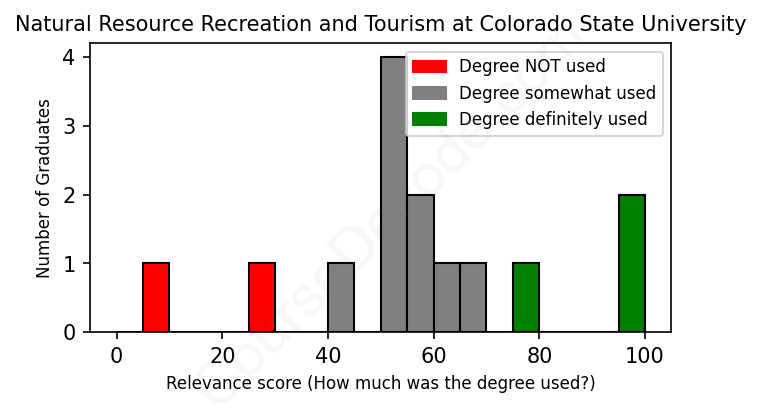
First, some facts. Of the Natural Resource Recreation and Tourism graduates from Colorado State University we've analyzed , here's how many have used (or NOT used) their degree in their career:

These are estimates based on AI analysis of 14 LinkedIn profiles (see below).
The verdict? Significantly below average. Overall, with an average relevance score of 56%, Natural Resource Recreation and Tourism graduates from Colorado State University have a much lower likelihood (-11%) of finding work in this field compared to the average graduate across all fields:
And for comparison, here's the chart for all profiles we've looked at across all degrees.
Also, after graduating, only 7% of these graduates have pursued further education other than another Bachelor's degree (such as a Masters degree or other), compared to the average across all profiles of 35%. This suggests a Bachelors degree is enough for most Natural Resource Recreation and Tourism graduates, and it's normal to look for work straight after graduation.
See the details:
|
Relevance score: 50% We think this person has gone into a career only somewhat relevant to their degree. We think this person has gone into a career only somewhat relevant to their degree.
DEGREE INFOGraduated in 2016 from Colorado State University with a Bachelor of Science (B.S.) in Natural Resource Recreation and Tourism. No other secondary education since. JOB HISTORY SINCE GRADUATIONEvent and Operations Coordinator Downtown Fort Collins Business Association Jan 2016 - Jun 2020 ABOUTDynamic, innovative, and results-driven professional offering six years of experience with extensive organizational skills in operations management and program implementation in the event and recreation industry. Exemplifies excellent record in communications with large groups of people, while successfully managing all phases of an event, from planning to implementation, resulting in high-quality productions. |
The top 10 most common jobs done by the graduates we've analyzed (ranked most common to least) are:
After analyzing the career paths of graduates from Colorado State University with a degree in Natural Resource Recreation and Tourism, it's clear that the field is pretty diverse. Many of the most common jobs include project management, sales coordination, and various roles in marketing, especially connected to tourism-related companies like Breckenridge Grand Vacations. However, while some of these jobs may touch on customer service or event planning—which can be relevant to recreation and tourism—the overall connection to the degree varies a lot. For instance, jobs like Project Coordinator or Sales Associate seem more focused on general organizational or sales skills rather than the specific knowledge of natural resource management or tourism.
On the flip side, there are certainly roles that align more closely with what you'd expect from a degree in this area. Positions like Trail Crew members, Raft Guides, and roles at tourism-oriented organizations like the Traverse City Tourism destination assistant show that some graduates do actively engage in recreation and tourism as outlined in their studies. Overall, it seems that while some graduates are leveraging their degree in relevant roles, many are finding themselves in positions where their specialized knowledge is not fully utilized, pointing to a mix of outcomes that could vary based on individual job choices and industry opportunities.
Here is a visual representation of the most common words in job titles for Natural Resource Recreation and Tourism graduates (this is across all Natural Resource Recreation and Tourism graduates we've analyzed, not just those who went to Colorado State University):

It looks like graduates from the Natural Resource Recreation and Tourism program at Colorado State University tend to have a mix of career paths after they finish their studies. For many, the first jobs right out of college often relate to customer service and sales in hospitality or tourism settings, like sales coordinators and various positions at vacation and travel-related companies. This makes sense, given the degree's focus on recreation and tourism. However, as they gain experience—usually about five years in—they often transition into more specialized roles, such as project coordinators and managers in related industries, indicating a progressive career path.
By the time they hit the ten-year mark after graduation, there’s a noticeable shift, as many are taking on management positions or roles in event coordination, marketing, and even consulting within larger organizations. While some graduates do seem to stray a bit from their field—taking jobs in sales or unrelated customer service—it's clear that many leverage their degrees into fulfilling careers that maintain a connection to tourism and natural resources. Overall, it looks like a rewarding journey for quite a few, blending their passion for the outdoors with professional growth, even if some have ended up in positions that might not seem directly aligned at first glance.
Getting a Bachelor’s degree in Natural Resource Recreation and Tourism, like the one at Colorado State University, can be pretty manageable, especially if you have a passion for the outdoors and enjoy hands-on learning. While every degree has its tough spots—like some science classes or projects that require a good amount of research—many students find these courses to be engaging and relevant. Overall, if you're someone who loves nature and is willing to put in the effort, it can feel more like an enjoyable journey than a grueling academic slog. So, it’s fair to say it leans on the easier side compared to more technical degrees, but like any degree, it has its challenges too!
Most commonly, in the LinkedIn profiles we've looked at, it takes people 4 years to finish a Bachelor degree in Natural Resource Recreation and Tourism.
It seems like the CSU grads from the Natural Resource Recreation and Tourism program have had a pretty mixed bag when it comes to earning potential. Some of them climbed the ladder quite well, like the one who went from Sales Coordinator to Project Control Specialist and is now with Xcel Energy, which is likely to pay well. Others seem to have stayed more in entry-level or seasonal roles, like the line cook and all those associated with the ski resort, which might not pay as much. Overall, those who gained experience in management or project coordination roles appear to have decent salaries, while those stuck in more hands-on or entry-level positions might be earning a bit less, making it a balance of doing what you love versus raking in cash!
Here is a visual representation of the most common words seen in the "about" section of LinkedIn profiles who have a Bachelor degree in Natural Resource Recreation and Tourism (this is across all Natural Resource Recreation and Tourism graduates we've analyzed, not just those who went to Colorado State University). This may or may not be useful:

Here are all colleges offering a Bachelor degree in Natural Resource Recreation and Tourism (ordered by the average relevance score of their Natural Resource Recreation and Tourism graduates, best to worst) where we have analyzed at least 10 of their graduates:
| College | Score | Count |
|---|---|---|
 Colorado State University Colorado State University
|
56 | 14 |